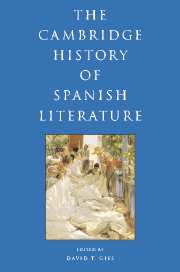Book contents
- Frontmatter
- I INTRODUCTION
- II HISTORY AND CANONICITY
- III THE MEDIEVAL PERIOD
- IV EARLY MODERN SPAIN: RENAISSANCE AND BAROQUE
- V THE ENLIGHTENMENT AND NEOCLASSICISM
- VI THE FORGING OF A NATION: THE NINETEENTH CENTURY
- VII THE MODERN, MODERNISMO, AND THE TURN OF THE CENTURY
- VIII TWENTIETH-CENTURY SPAIN AND THE CIVIL WAR
- IX IN AND OUT OF FRANCO SPAIN
- X POST-FRANCO SPANISH LITERATURE AND FILM
- 52 Spanish literature between the Franco and post-Franco eras
- 53 Post-Franco poetry
- 54 Spanish prose, 1975–2002
- 55 Post-Franco theatre
- 56 Spanish literature and the language of new media
- Bibliography
- Index
- References
56 - Spanish literature and the language of new media
from X - POST-FRANCO SPANISH LITERATURE AND FILM
Published online by Cambridge University Press: 28 March 2008
- Frontmatter
- I INTRODUCTION
- II HISTORY AND CANONICITY
- III THE MEDIEVAL PERIOD
- IV EARLY MODERN SPAIN: RENAISSANCE AND BAROQUE
- V THE ENLIGHTENMENT AND NEOCLASSICISM
- VI THE FORGING OF A NATION: THE NINETEENTH CENTURY
- VII THE MODERN, MODERNISMO, AND THE TURN OF THE CENTURY
- VIII TWENTIETH-CENTURY SPAIN AND THE CIVIL WAR
- IX IN AND OUT OF FRANCO SPAIN
- X POST-FRANCO SPANISH LITERATURE AND FILM
- 52 Spanish literature between the Franco and post-Franco eras
- 53 Post-Franco poetry
- 54 Spanish prose, 1975–2002
- 55 Post-Franco theatre
- 56 Spanish literature and the language of new media
- Bibliography
- Index
- References
Summary
M, it would appear, felt violated.
M, for those who are not intimately acquainted with the succès de scandale in question, is the much-lauded Spanish novelist Javier Marías, who published a petulant article in El País concerning his treatment at the hands of the father–daughter team, Elías and Gracia Querejeta, producer and director, respectively, of the film adaptation of Marías’ novel Todas las almas (“All Souls,” 1989). While it is not in the least unusual for writers to decry publicly the inadequacies of films that have been based on their work, what is notable here is the way in which Marías makes explicit the subtext of sexual deviance that, as Robert Stam suggests, usually only lurks beneath the surface of such discussions of filmic “infidelity.” For Marías is uncomfortable, above all, with the film’s specific representations of sexuality. Indeed, the author begins his article by recounting (in the third person, and using the initials M, Q, and Q for the three parties concerned) a conversation that he has had with Q senior concerning the homosexuality of one of the characters (Cromer-Blake), and the possibility of a sexual relationship between that character and another male protagonist (Toby Rylands). Marías insists that such a relationship is unthinkable, and then records his astonishment at Q senior’s response: “Aun así Q insistió con una pregunta en verdad genialoide: ‘¿Estás seguro?’ M pudo haber sido sarcástico pero no lo fue, se limitó a contestar lo obvio: ‘¿Cómo no voy a estar seguro, si el libro lo he escrito yo?’ M, ingenuo, respiró con alivio creyendo haber atajado a tiempo un grave malentendido de lectura’ (“Even so Q insisted with a truly brilliant-ish question: ‘Are you sure?’ M could have been sarcastic, but he wasn’t, he limited himself to responding with the obvious: ‘How could I not be sure, if it is I who wrote the book?’ M, ingenuous, sighed with relief thinking that he had prevented a grave misreading, just in time”).
- Type
- Chapter
- Information
- The Cambridge History of Spanish Literature , pp. 739 - 755Publisher: Cambridge University PressPrint publication year: 2005



